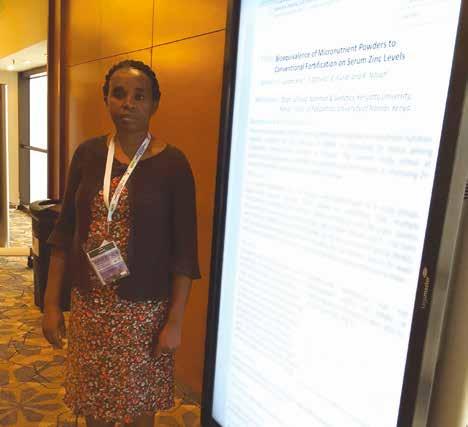
2 minute read
A career growing opportunity; Learning from an international conference
Dr Juliana Kiio, Kenyatta University, Kenya
Ifirst became aware of the International Union of Nutritional Sciences International Congress of Nutrition (IUNS-ICN) at the Federation of African Nutrition Societies (FANUS) 3rd Conference in 2015 held in Tanzania. At the end of the conference, everybody’s parting words were …”let us see each other again in Argentina”. I promised myself that I would be there with the others. I could meet the costs of registering for the conference, but could only imagine how costly the trip from Kenya to Argentina would be. However, I was determined to attend this important international Congress by any means.
After completion of my PhD studies in 2016, my academic supervisor encouraged me to present my findings at the IUNS-ICN because it enables dissemination of research at an international level. This was my dream too. As well as presenting, I was also motivated to attend the congress to understand where the rest of the world is in terms of current research gaps particularly in the areas of micronutrient deficiencies, food fortification, food security, and maternal and young child feeding, which are my personal areas of research interest. A main expectation of attending the congress was to network with other researchers.
My dream came true when my abstract was accepted for a poster presentation, but, the big question was where to get the funding. Being a member of the Nutrition Society, I learnt that they offer travel grants to early career nutritionists. When the Nutrition Society granted me the travel grant I was delighted and saw it as a big opportunity to grow within my profession as a researcher.
On attending the IUNS conference, I had the opportunity to listen to different presenters and was able to learn a lot about a variety of nutritional science outside my immediate research area.
Of much interest to me was the role of zinc transporter proteins in maintaining zinc homeostasis at the cellular levels, the reliability of body composition measurements in assessing nutrition status especially the isotopic techniques, functional foods, new food product development, and the use of technology to improve nutritional value of food products. The effect of environmental factors on stunting among young children was presented by several different speakers, and the reliability of using stunting as an indicator of development was a centre of discussions. Factors affecting food choices were also an area where I gained knowledge, particularly as it applies to developing countries. I also learnt a lot on how to make agriculture nutrition sensitive and the current progress.
From my presentation, I learned how to make the presentation concise whilst ensuring the findings and ideas could be easily understood by the audience.
Attendance of the conference was an eye opener for me considering the high level and quality of the research which was presented. I learnt much on new research methodologies and tools, and this will greatly enhance my future research experience. Finally, this was also an opportunity to network and I was able to establish new links with other researchers with the possibility of future research collaborations.
I feel privileged to have received the travel grant to attend this international conference from which I benefited greatly, and I believe has contributed to my career growth. Thank you to the Nutrition Society.


